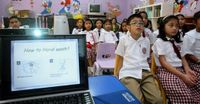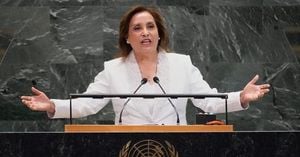The United Arab Emirates (UAE) is set to integrate artificial intelligence (AI) into the curriculum of public schools starting in the 2025-2026 academic year, aiming to establish itself as a regional powerhouse in AI development. This announcement was made by UAE's Deputy President and Prime Minister Sheikh Mohammed bin Rashid Al Maktoum on May 4, 2025, highlighting the nation's commitment to educating its youth in a rapidly evolving technological landscape.
The new AI curriculum will be implemented for students from kindergarten through 12th grade, encompassing approximately 300,000 students in public schools. The curriculum includes essential components such as ethical awareness, foundational concepts, and practical applications of AI. In a post on X (formerly Twitter), Sheikh Mohammed bin Rashid Al Maktoum emphasized the importance of understanding AI from a technical perspective while fostering an ethical consciousness regarding this transformative technology.
“Our goal is to help children deeply understand AI from a technical perspective, while raising their awareness of the ethics related to this new technology,” he stated. He further noted, “Our responsibility is to prepare the younger generation to enter an era unlike ours, with conditions different from ours.” This initiative reflects the UAE's long-term strategy to equip future generations with the skills necessary to thrive in a technologically advanced world.
The AI curriculum is structured around seven core areas: basic concepts, data and algorithms, software usage, ethical awareness, practical applications, innovation and project design, and policies and community engagement. The program is tailored to different age groups, beginning with children as young as four, who will engage in interactive activities and storytelling to explore AI and digital technologies.
In the first cycle of the curriculum, students will compare machines with humans while developing their digital thinking skills and exploring AI applications. The second cycle will focus on designing and evaluating AI systems, understanding biases, and emphasizing ethical technology use. The third cycle will prepare students for higher education and careers by teaching command techniques through simulated real-world situations.
Classes will be taught by designated teachers as part of the Computer Science, Creative Design, and Innovation subjects. The UAE's Ministry of Education will oversee the curriculum's implementation, ensuring it provides both technical understanding and ethical considerations regarding technology.
In line with its national strategy, the UAE aims to become a global leader in AI by 2031. The government has made significant investments in AI, including the establishment of the first Ministry of AI in the world in 2017 and a specialized university in Abu Dhabi focused on this technology. Recently, the UAE committed to investing between 30 and 50 billion euros to build a massive AI data center in France, further underscoring its ambition in the AI sector.
Sheikh Hamdan bin Mohammed, the Crown Prince of Dubai, remarked last month, “This is the age of AI.” He stressed that global collaboration is essential for maximizing the benefits of AI and expanding its positive impact on society. The UAE is taking steps to foster an environment that attracts AI professionals from around the world, aiming to push the boundaries of this technology to enhance growth and improve quality of life.
Moreover, the UAE Cabinet has approved the deployment of the first integrated legal information system within the government, which is based on advanced AI technology. This new legal system is expected to expedite the legislative process by up to 70%, utilizing AI tools to streamline research, drafting, evaluation, and promulgation.
Minister of Education Sarah Al Amiri has described the integration of AI into education as a "national command," emphasizing that it supports economic growth, promotes sustainable development, and significantly enhances individual capabilities. The UAE is among the first countries to prioritize AI education for students as part of its national strategy, reflecting a forward-thinking approach to educational reform.
Over the past six years, the UAE has hosted an AI Summer Camp, organized by the Ministry of State for Artificial Intelligence, Digital Economy, and Remote Work Applications. This initiative has helped thousands of young people learn about AI, coding, and skills geared toward the future. The introduction of AI into the public school curriculum is seen as a crucial step in preparing students for a future where technology will play an increasingly central role in everyday life.
As the UAE embarks on this ambitious educational initiative, it is clear that the integration of AI into the school curriculum is not merely a trend but a foundational element of the country's strategy to diversify its economy and reduce reliance on oil. By prioritizing AI education, the UAE aims to equip its youth with the knowledge and skills necessary to navigate a rapidly changing technological landscape, ensuring they are prepared to contribute to and thrive in the global economy.




